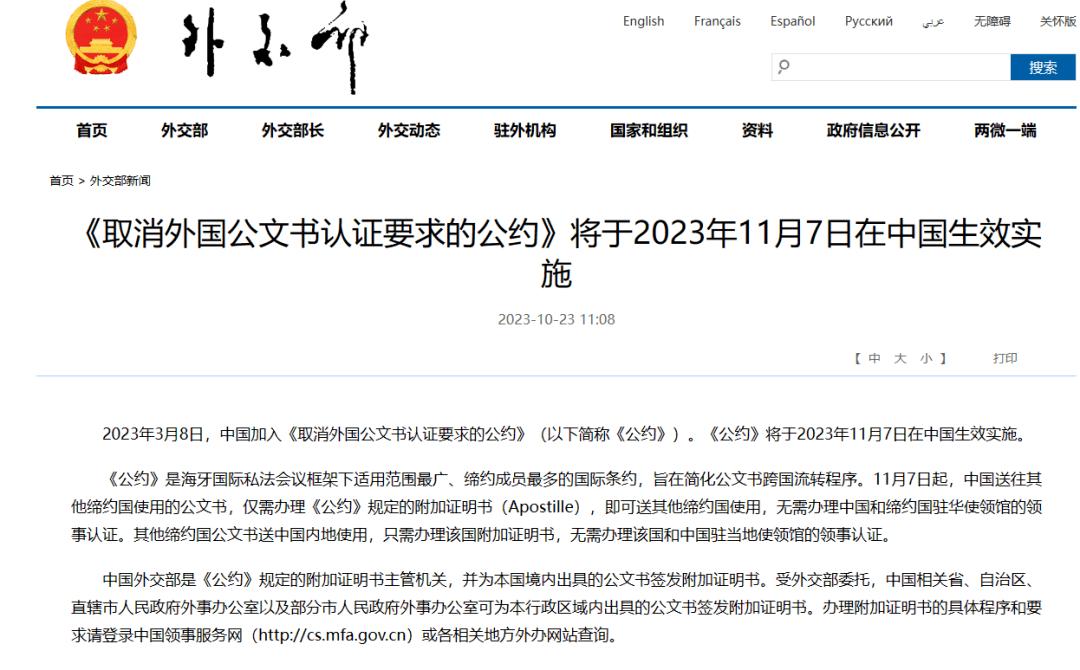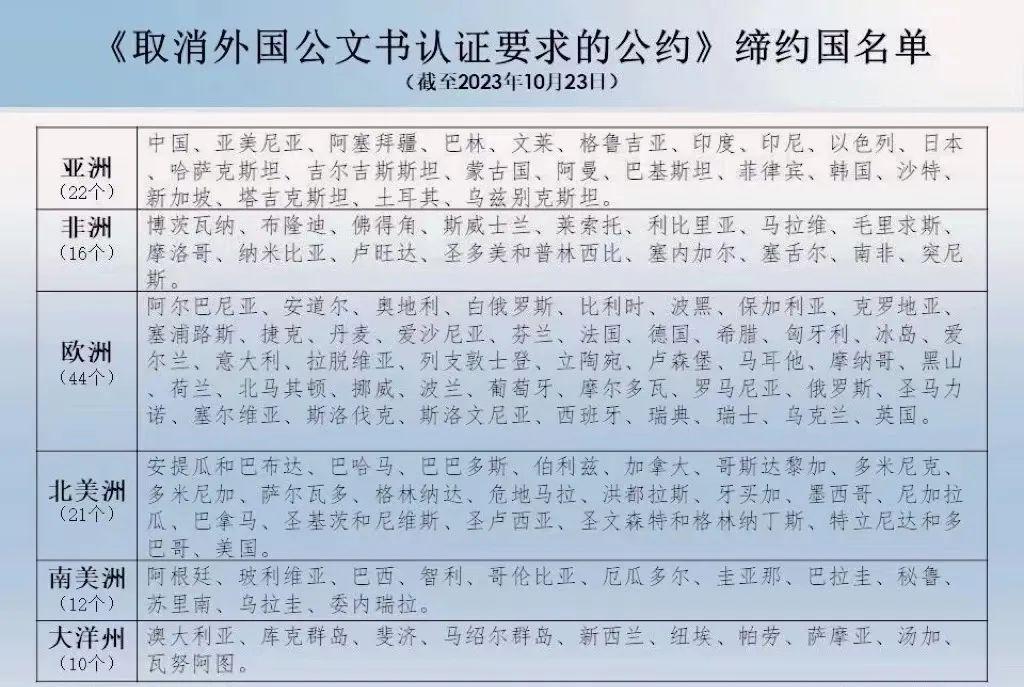

Recently, some overseas clients have expressed concerns about handling cross-border legal authorizations, fearing that the notarization and legalization process may take too long and cause delays. In light of this, Lingyun Yongran reminds everyone that China has made significant changes to its notarization and legalization procedures for foreign documents. These changes stem from China's accession to the Convention Abolishing the Requirement of Legalization for Foreign Public Documents (hereinafter referred to as the Convention), which officially came into effect in China on November 7, 2023.

(Source: Ministry of Foreign Affairs of China)
Previously, China required a full set of notarization and consular legalization procedures for foreign public documents. The legalization process involved consular authentication, where Chinese embassies and consulates abroad verified the authenticity of the last seal or signature on the document. However, with the Convention in force, consular legalization has been replaced by an Apostille, issued by the competent authority of the country where the document originated. Since the Convention was established in The Hague, this method of authentication is commonly known as the Hague Apostille.
The Convention aims to simplify the international circulation of public documents, replacing the traditional consular legalization process with a more convenient verification method. This change promotes international trade, business, and personnel exchanges.
In recent years, the Convention has seen rapid growth in membership, with 125 contracting states, covering about three-fifths of the world's countries and regions. This includes major trading partners of China, such as the European Union, the United States, Japan, South Korea, Germany, Australia, and Russia, as well as most Belt and Road Initiative countries.

Impact on Legal Affairs
From a legal practice perspective, China’s adoption of the Hague Apostille system among contracting states marks a significant advancement in international legal cooperation. This change reflects the growing mutual trust in legal systems, improvements in administrative efficiency, and the challenges of cross-border governance in a globalized world. Overall, the simplification of the authentication process holds great practical significance.
1. Reducing Costs and Legal Barriers
By simplifying authentication procedures, this reform lowers the costs associated with cross-border activities such as studying abroad, trade, and marriage. It reduces legal barriers, facilitates the free movement of people, capital, and information, and aligns with global trends. The traditional consular legalization process was complex and time-consuming, but its abolition significantly shortens document processing times and lightens the burden on individuals and businesses.
2. Expediting Cross-Border Dispute Resolution
Simplified authentication procedures also accelerate the resolution of cross-border disputes. In international commercial arbitration and litigation, the quick authentication of evidentiary materials—such as company registration documents and notarized contracts—shortens case processing times and prevents procedural delays that could harm the parties involved. The streamlined document authentication process supports the implementation of conventions such as the Convention on the Recognition and Enforcement of Foreign Judgments, facilitating the cross-border circulation of court rulings.
3. Facilitating Cross-Border Business and Intellectual Property Protection
With China’s accession to the Convention, foreign-related legal matters—such as cross-border investments and intellectual property protection—can now rely on Apostilled documents instead of consular legalization. This reduces regulatory barriers for Chinese companies expanding abroad.
For example, in overseas mergers and acquisitions, Chinese enterprises will no longer need consular authentication for corporate qualification documents, speeding up transaction processes.
4. Digitalization and Efficiency Gains
This transformation is also driven by digital authentication technologies. Many contracting states now offer electronic Apostilles (e-Apostilles), further enhancing efficiency and ensuring secure and seamless authentication processes.
Key Considerations
The Hague Apostille does not certify the authenticity or legality of the document’s content. The principle of “whoever issues, takes responsibility” still applies, meaning that the issuing authority remains responsible for the accuracy of the document’s content.
China will continue to follow the original consular legalization process for non-contracting states of the Convention. Additionally, the Convention does not apply to:
Members of the Convention that China does not recognize as sovereign states.
Documents exchanged between China and India.
Definition of “Public Documents” under the Convention:
The Convention broadly categorizes public documents into four types:
(1) Documents issued by courts or judicial authorities, including those from prosecutors, court clerks, and enforcement officers.
(2) Administrative documents issued by government agencies.
(3) Notarial acts, including notarized documents.
(4) Official certificates attached to private documents, such as registration approvals, date authentications, and signature verifications.
Since there are numerous types of documents encountered in practice, Chinese authorities may further clarify which documents specifically fall under the definition of “public documents”.
Conclusion
The abolition of consular legalization for foreign public documents is not just a procedural reform; it represents a milestone in international legal cooperation. By lowering barriers to cross-border legal matters, enhancing mutual trust, and promoting technology adoption, this change reshapes global legal practice in terms of efficiency and regulatory frameworks.
However, the success of this reform depends on:
The alignment of national legal systems.
Enhanced security measures against forgery.
Improved international cooperation mechanisms.
For legal professionals, this shift requires not only a strong grasp of international regulations but also an embrace of technological tools to navigate the increasingly complex global legal landscape.
About Lingyun Yongran
With extensive experience in intellectual property enforcement for major international software companies, Lingyun Yongran has developed deep expertise in foreign-related legal matters, including the latest technological applications. We welcome inquiries and discussions.